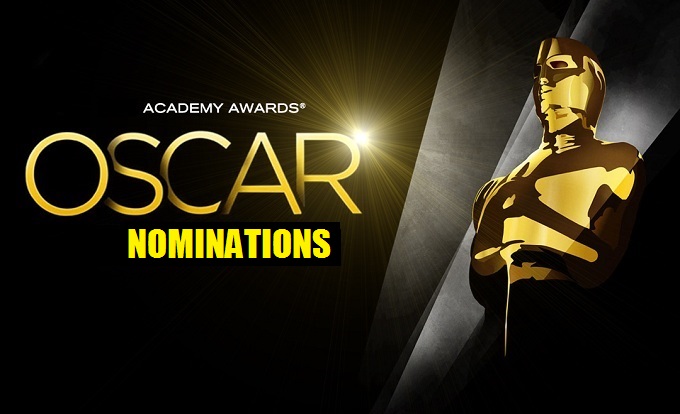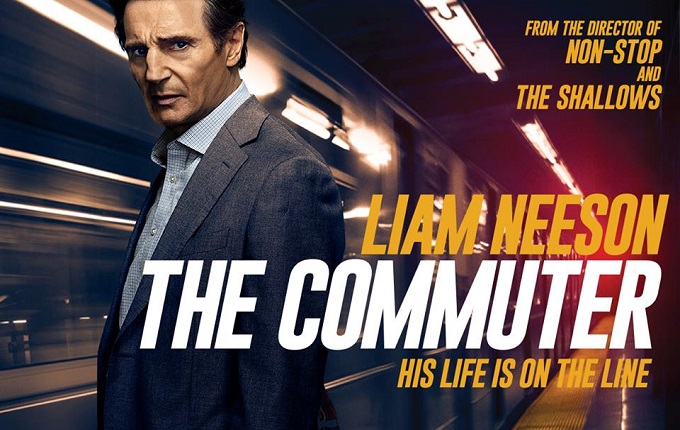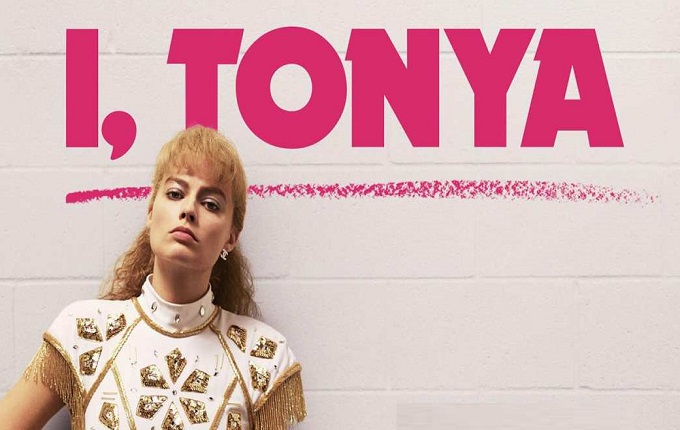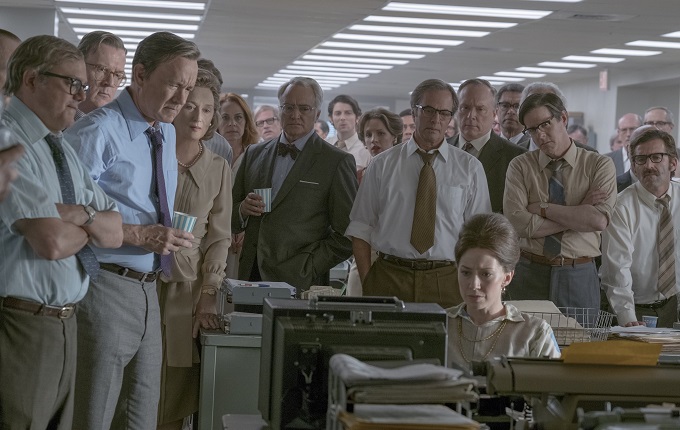Oscar Nominations 2018

The nominations for the 90th Academy Awards have been announced in Los Angeles with The Shape Of Water leading the way with 13 nominations. Three Billboards Outside Ebbing Missouri, I, Tonya, Phantom Thread, Dunkirk, Lady Bird and Get Out also all featured prominently across all categories.
Milestones this year also included Greta Gerwig becoming just the 5th female nominee for best director and Mudbound cinematographer Rachel Morrison making history as the first ever female nominees in the best cinematography category.
Though some categories have clear front runners based on the pattern of other recent awards, many including best picture remain open races in a highly competitive year. many are predicting honours could be well spread across the night rather than seeing a typical sweep for a single film.
For now the nominees list in full below:
Best picture
- Call Me By Your Name
- Darkest Hour
- Dunkirk
- Get Out
- Lady Bird
- Phantom Thread
- The Post
- The Shape of Water
- Three Billboards Outside Ebbing, Missouri
Best actress
- Sally Hawkins – The Shape of Water
- Frances McDormand – Three Billboards Outside Ebbing, Missouri
- Margot Robbie – I, Tonya
- Saoirse Ronan – Lady Bird
- Meryl Streep – The Post
Best actor
- Timothee Chalamet – Call Me By Your Name
- Daniel Day-Lewis – Phantom Thread
- Daniel Kaluuya – Get Out
- Gary Oldman – Darkest Hour
- Denzel Washington – Roman J Israel, Esq
Best supporting actress
- Mary J Blige – Mudbound
- Allison Janney – I, Tonya
- Lesley Manville – Phantom Thread
- Laurie Metcalf – Lady Bird
- Octavia Spencer – The Shape of Water
Best supporting actor
- Willem Dafoe – The Florida Project
- Woody Harrelson – Three Billboards Outside Ebbing, Missouri
- Richard Jenkins – The Shape of Water
- Christopher Plummer – All the Money in the World
- Sam Rockwell – Three Billboards Outside Ebbing, Missouri
Best director
- Dunkirk – Christopher Nolan
- Get Out – Jordan Peele
- Lady Bird – Greta Gerwig
- Phantom Thread – Paul Thomas Anderson
- The Shape of Water – Guillermo Del Toro
Best adapted screenplay
- Call Me By Your Name – screenplay by James Ivory
- The Disaster Artist – screenplay by Scott Neustadter & Michael H Weber
- Logan – screenplay by Scott Frank & James Mangold and Michael Green; story by James Mangold
- Molly’s Game – written for the screen by Aaron Sorkin
- Mudbound – screenplay by Virgil Williams and Dee Rees
Best original screenplay
- The Big Sick – written by Emily V Gordon & Kumail Nanjiani
- Get Out – written by Jordan Peele
- Lady Bird – written by Greta Gerwig
- The Shape of Water – screenplay by Guillermo del Toro & Vanessa Taylor; story by Guillermo del Toro
- Three Billboards Outside Ebbing, Missouri – written by Martin McDonagh
Best foreign language film
- A Fantastic Woman (Chile)
- The Insult (Lebanon)
- Loveless (Russia)
- On Body and Soul (Hungary)
- The Square (Sweden)
Best original song
- Mighty River – Mudbound (Mary J Blige, Raphael Saadiq & Taura Stinson)
- The Mystery of Love – Call Me By Your Name (Sufjan Stevens)
- Remember Me – Coco (Kristen Anderson-Lopez and Robert Lopez)
- Stand Up for Something – Marshall (Common & Diane Warren)
- This Is Me – The Greatest Showman (Benji Pasek & Justin Paul)
Best original score
- Dunkirk – Hans Zimmer
- Phantom Thread – Jonny Greenwood
- The Shape of Water – Alexandre Desplat
- Star Wars: The Last Jedi – John Williams
- Three Billboards Outside Ebbing, Missouri – Carter Burwell
Best animated feature
- The Boss Baby
- The Breadwinner
- Coco
- Ferdinand
- Loving Vincent
Best documentary feature
- Abacus
- Faces Places
- Icarus
- Last Men in Aleppo
- Strong Island
Best cinematography
- Blade Runner 2049 – Roger Deakins
- Darkest Hour – Bruno Delbonnel
- Dunkirk – Hoyte van Hoytema
- Mudbound – Rachel Morrison
- The Shape of Water – Dan Laustsen
Best costume design
- Beauty and the Beast – Jacqueline Durran
- Darkest Hour – Jacqueline Durran
- Phantom Thread – Mark Bridges
- The Shape of Water – Luis Sequeira
- Victoria and Abdul – Consolata Boyle
Best make-up and hairstyling
- Darkest Hour – Kazuhiro Tsuji, David Malinowski & Lucy Sibbick
- Victoria and Abdul – Daniel Phillips & Lou Sheppard
- Wonder – Arjen Tuiten
Best production design
- Beauty and the Beast – production design by Sarah Greenwood; set decoration by Katie Spencer
- Blade Runner 2049 – production design by Dennis Gassner; set decoration by Alessandra Querzola
- Darkest Hour – production design by Sarah Greenwood; set decoration by Katie Spencer
- Dunkirk – production design by Nathan Crowley; set decoration by Gary Fettis
- The Shape of Water – production design by Paul Denham Austerberry; set decoration by Shane Vieau and Jeff Melvin
Best visual effects
- Blade Runner 2049 – John Nelson, Gerd Nefzer, Paul Lambert & Richard R Hoover
- Guardian of the Galaxy Vol 2 – Christopher Townsend, Guy Williams, Jonathan Fawkner & Dan Sudick
- Kong: Skull Island – Stephen Rosenbaum, Jeff White, Scott Benza & Mike Meinardus
- Star Wars: The Last Jedi – Ben Morris, Mike Mulholland, Neal Scanlan & Chris Corbould
- War for the Planet of the Apes – Joe Letteri, Daniel Barrett, Dan Lemmon & Joel Whist
Best film editing
- Baby Driver – Paul Machliss & Jonathan Amos
- Dunkirk – Lee Smith
- I, Tonya – Tatiana S Riegel
- The Shape of Water – Sidney Wolinsky
- Three Billboards Outside Ebbing, Missouri – Jon Gregory
Best sound editing
- Baby Driver – Julian Slater
- Blade Runner 2049 – Mark Mangini and Theo Green
- Dunkirk – Richard King and Alex Gibson
- The Shape of Water – Nathan Robitaille and Nelson Ferreira
- Star Wars: The Last Jedi – Matthew Wood and Ren Klyce
Best sound mixing
- Baby Driver – Julian Slater, Tim Cavagin and Mary H Ellis
- Blade Runner 2049 – Ron Bartlett, Doug Hemphill and Mac Ruth
- Dunkirk – Mark Weingarten, Gregg Landaker and Gary A Rizzo
- The Shape of Water – Christian Cooke, Brad Zoern and Glen Gauthier
- Star Wars: The Last Jedi – David Parker, Michael Semanick, Ren Klyce and Stuart Wilson
Best animated short
- Dear Basketball
- Garden Party
- Lou
- Negative Space
- Revolting Rhymes
Best live action short
- DeKalb Elementary
- The Eleven O’Clock
- My Nephew Emmet
- The Silent Child
- Watu Wote/All of Us
Best documentary short
- Edith + Eddie
- Heaven Is a Traffic Jam on the 405
- Heroin(e)
- Knife Skills
- Traffic Stop
The Commuter Review

The Plot
A businessman is caught up in a criminal conspiracy during his daily commute home.
The Good
Liam Neeson adds to his ever growing catalogue of action films that have clogged his career since the surprise hit of 2008’s Taken withThe Commuter. This time however it’s his wife and son as opposed to his wife and daughter who are in danger as they’re taken hostage offscreen in an attempt to force Neeson’s aged ex-cop Michael MacCauley to do ‘one little thing’ for the mysterious Joanna (Vera Farmiga) which will result in the death of a passenger.
With a supporting cast which includes Patrick Wilson, Andy Nyman and the underused performances from Sam Neill and Jonathan Banks, The Commuter certainly has enough star power to reel you in. Most surprising of all is Florence Pugh who is completely unrecognisable from her previous role in Lady MacBeth, so much so that this writer didin’t even notice her, which is the highest of compliments.
The story is easy enough to follow and plays out at times like a backwards modernised Murder On the Orient Express (though without any gorgeous moustaches) and no matter how ludicrous it gets the entertainment value is just the same as director Jaume Collet-Serra’s previous work (The Shallows) and works as a worthy addition to the now trilogy of collaborations with Neeson after 2011’s Unknown and 2014’s Non-Stop.
The Bad
Having already taken on the Harrison Ford trope of ‘where’s my wife and son!’ it’s a shame to see that Neeson doesn’t utter the phrase ‘get off my train’ at any point. Furthermore it’s a shame he doesn’t kick a train in the face which is what this writer was looking forward to. Suffice to say if you go into this looking for anything serious you’ll be deeply disappointed and may miss the action packed fun that The Commuter provides. If the homage to Spartacus doesn’t have you giggling away then you clearly aren’t the audience that the producers are trying to hook in.
The Ugly Truth
At its very essence, The Commuter is perfect Saturday night multiplex fodder that, if you’re close your logic can very easily become a highlight of the years cinema trips. It’s not necessarily Schindler’s List nor is it at the very top of Neeson’s recent action collection. But that doesn’t mean it can’t be a damn good 105 minutes to spend.
I, Tonya Review

The Plot
I,Tonya documents the rise and fall of controversial Ice Skating superstar Tonya Harding based on astonishing real life events and conflicting personal accounts. The film charts her unlikely path to figure skating glory, her dysfunctional marriage and her ultimately violent rivalry with fellow USA skater Nancy Kerrigan.
The Good
Margot Robbie delivers a truly Oscar worthy performance playing the infamously iconic Tonya Harding from awkward adolescent through to regretful middle aged cynicism. Aside from the obvious physical transformation and intensive ice skating training that Robbie had to endure to play the part, the emotional toll of playing the vulnerably unhinged young Olympian is self-evident. Robbie is able to morph effortlessly into the many different versions of Harding that the story demands, somehow managing to perfectly encapsulate and challenge audiences likely preconceptions at the same time.
Around Robbie’s breathtakingly good central performance supporting turns from Sebastian Stan, Paul Walter Hauser and Allison Janney are scene stealing delights. Janney is on fine foul mouthed form as Harding’s belligerently mean spirited mother, Stan shines as Harding’s husband Jeff Gillooly, while Paul Walter Hauser is a comic joy as Gillooly’s ridiculously delusional best friend Shawn. The combined cast help paint a portrait of Harding’s life that is both hysterically entertaining and disturbed.
Extensive world class skating sequences are a major technical challenge for the film. Thankfully though a combinations of Robbie’s dedication and well applied visual effects it’s possible to make Robbie a convincing skating superstar. It’s especially important that the film does succeed in doing this as arguably seeing Harding’s breath-taking skill and athletic bravery is an essential counterpoint to the infamous disaster of her life when off the ice.
Overall I, Tonya is magnificent fun and skilfully pays with its occasional mockumentary style to illustrate the competing versions of the truth that continue to confuse one of the most bizarre and memorable moments in sporting history. Robbie’s award worthy central performance and a magnificently well-chosen soundtrack propel the movie with all the desperate grace and danger of someone performing a triple axel jump on ice….
The Bad
More critical audiences might object on principal to the notion of in any way deliberately or accidentally glamorizing Tonya Harding’s behaviour and her apparent ‘crimes’. It’s a fine line to tread between capturing an accurate well balanced portrait of one of the most notorious sporting figures of all time and the risk of appearing either overly sympathetic or sensationalist. Thought the film does largely succeed in this respect, obviously those with preconceived notions about Harding and what she represents to professional athletics may find the existence of a big screen version less welcome.
The Ugly Truth
Fuelled by a relentlessly brilliant performance by Margot Robbie, this unconventional sporting biopic is consistently hilarious, tragic and wildly entertaining. Robbie’s portrayal of the notorious former Olympian is simultaneously psychotic and sympathetic. The result of this astonishing star turn is two hours of compelling viewing
Review by Russell Nelson
The Post Review

The Plot
Based on the sensational true story The Post follows the legal battle between Nixon’s Whitehouse administration and The Washington Post over efforts to publish sensational revelations about the Vietnam War contained in classified government documents.
The Good
Director Steven Spielberg has a brilliant track record for documenting historical events in a dramatic and accessible way. His past work on Schindler’s List and Lincoln established his astonishing credentials in handling significant moments in global history with skill and due care. Spielberg brings his obvious passion to the cause of a free and fair press to the screen, having hastily made The Post seemingly as an act of urgent political necessity. That enthusiasm and sense of urgency does permeate the best moments of the film, bringing to life the thrill and perils of good journalism.
Meryl Streep and Tom Hanks both on predictably fine form, help inject some genuine personality into the real life news titans they portray. At this stage in their career their mere presence on screen is enough to make audiences realise that it’s important they pay attention. It’s almost as if they each emanate a constant Oscar winning glow, reassuring audiences of the unquestioned importance of proceedings.
Unsurprisingly given the Hollywood royalty behind the camera and in the two lead roles, the surrounding ensemble cast in The Post is littered with familiar faces and accomplished turns from brilliant character actors. The presence and nuanced sincerity of people like Bob Odenkirk and Bruce Greenwood helps lend added depth and sophistication to an otherwise simple story.
Though those familiar with the historical events the film documents may understandably find that the race against time dilemmas The Post explores are robbed of a little tension, thankfully fine performances hold audience’s attention in spite of this. Though the passage of time may have robbed these events of their modern reliance, the film does at least serve as an effective homage to an increasingly bygone era of exciting investigative journalism.
The Bad
While The Post does it’s best to capture the tension of a difficult dilemma of journalistic integrity, the importance of Vietnam War scandal may connect less with younger audiences for whom this chapter of American and world history feels increasingly remote. While some will be quick to try to draw direct parallels with modern political and media issues, in truth it’s difficult to connect these historic events with the dramatically evolved modern world.
Celebrating the golden era of investigative print journalism can’t entirely distract from the general collapse of the industry and the new more complex dilemmas arising from the new increasingly digital news landscape.
While The Post is well crafted it’s perhaps also difficult to avoid direct comparisons with other acclaimed films exploring similar themes such as All The President’s Men and more recently Spotlight. The Post perhaps doesn’t quite have as much emotional and political complexity as those films, though that’s amore a reflection on the facts of history than any particular filmmaking failure.
The Ugly Truth
Iconic director Steven Spielberg and the combined talents of an astonishing ensemble cast breathe life into a point in political, legal and media history that raises some of the same question and concerns that face a modern day audience. The Presence of stars Like Streep and Hanks lends the relatively straightforward events of the film the sense of gravitas and drama it requires.
Review by Russell Nelson
National Film Awards 2018 Full Nominations List

Jude Law, Julie Andrews, Ewan McGregor, Daniel Kaluuya, Harry Styles, Halle Berry & Gemma Arterton are among stars shortlisted for this year’s prestigious National Film Awards UK in 2018.
The National Film Academy today announced the nominations for the National Film Awards UK for 2018. This year a record 2.4 million movie fans nominated across 18 categories to make up the official shortlist.
Dunkirk is nominated in three categories including Best British Film, Best Director, and Best Newcomer for pop star turned actor, Harry styles who receives a nod for his performance as Alex. Styles goes head to head with ‘Get Out’ star Daniel Kaluuya and an array of new talent including; Harry Gilby (Just Charlie), Harry Michell (Chubby Funny) , Cosmo Jarvis (Lady Macbeth), Lily Newmark (Pin Cushion) , Naomi Ackie (Lady Macbeth) and Ella Purnell (Access All Areas) all nominated for the Best Newcomer category.
Guy Ritchie’s; King Arthur: Legend of the Sword receives three nominations in the Best Drama, Best Action and Best Director categories.
Sir Elton John receives his first National Film Academy nomination for the ‘Best Breakthrough Performance’ following his cameo appearance in Kingsman (The Golden Circle). The film also receives a record nine Academy nominations including;Best British Film, Best International Film, Best Comedy and Director Matthew Vaughn picks up a nomination for Best Director. Taron Egerton is nominated in the Best Actor category for his role as ‘Eggsy’ while American actress Halle Berry is nominated for two categories including the Best Supporting Actress & Best Breakthrough Performance for her role as ‘Ginger’ in the franchise. Keith Allen goes head to head with Colin Firth who are both nominated in the Best Supporting Actorcategory.
Gemma Arterton picks up a nomination in the Best Actress category for her role as Catrin Cole in Their Finest and competes in the same category with Alice Lowe (Prevenge) , Florence Pugh (Lady Macbeth) , Tatjana Inez (Redwood), Ruth Wilson (Dark River) , Emily Beecham (Daphne), Kristin Scott Thomas (The Party) andNathalie Emmanuel (Fast & Furious ![]()
The National Film Awards UK is one of the few motion picture awards shows to provide a platform for movie fans to nominate and vote for their favourite films and talent. Voting goes live from the 15th of January 2018 until the 26th of March 2018.Winners will be announced at the awards ceremony taking place at The Porchester on the 28th of March with highlights televised for broadcast on Sky Showcase and syndicated across all major global territories.
Full List of the National Film Awards UK (2018) nominees:
Best Actress
Alice Lowe ( Prevenge)
Florence Pugh ( Lady Macbeth)
Gemma Arterton (Their Finest)
Tatjana Nardone (Redwood)
Ruth Wilson (Dark River)
Emily Beecham (Daphne)
Kristin Scott Thomas (The Party)
Nathalie Emmanuel (Fast & Furious ![]()
Best Newcomer
Daniel Kaluuya (Get out)
Harry Styles (Dunkirk)
Harry Gilby (Just Charlie)
Harry Michell (Chubby Funny)
Cosmo Jarvis (Lady Macbeth)
Lily Newmark (Pin Cushion)
Naomi Ackie (Lady Macbeth)
Ella Purnell (Access All Areas)
Best Supporting actress in association with Serenity & Grace
Naomi Ackie ( Lady Macbeth)
Patricia Clarkson (The Party)
Julie Walters (Film stars don’t die in Liverpool)
Kelly Macdonald (Goodbye Christopher Robin)
Judith Roberts (You Were Never Really Here)
Halle Berry (Kingsman, The Golden Circle)
Jane Asher (Brian Pern: A Tribute)
Elarica Johnson (How to Talk to Girls at Parties)
Best Supporting Actor in association with DeChavel Watches
Robert Webb (Back)
Sam Gillet (A Caribbean Dream)
Keith Allen (Kingsman ‘The Golden Circle’)
Jordan Stephens (Access All Areas)
Paul Whitehouse (Brian Pern: A Tribute)
Lucien Laviscount (Snatch)
Matt Lucas (Brian Pern: A Tribute)
Joseph Vijay (Mersal)
Best Drama
The Limehouse Golem
My Cousin Rachel
Breathe
I Am Not a Witch
You Were Never Really Here
Borg vs McEnroe
Three Billboards Outside Ebbing, Missouri
A Caribbean Dream
The Hatton Garden Job
King Arthur: Legend of the Sword
Best TV Drama Series
Broadchurch, S3
Guerrilla
White Gold
Taboo
Howards End
Back
Halcyon
Snatch
The Cuckoo’s Calling
Best Thriller
Prevenge
Redwood
You Were Never Really Here
Eat Locals
The Moving Theatre
Hellriser
The Snowman
Best Foreign Language Film
Happy End (France)
Loveless (Russia)
In The Fade (Germany/France)
The Square (Sweden, Germany, France)
A Fantastic Woman, (Chile)
Vaya (South Africa)
The Insult (Lebanon)
Mersal (India)
Best Action
Antimatter
Trespass Against Us
Jawbone
Baby Driver
Essex Heist
Smoking Guns (aka A Punters Prayer)
Borg vs McEnroe
King Arthur: Legend of the Sword
We Still Steal the Old Way
Best Independent Film
God’s own country
Film stars don’t die in Liverpool
The Intent
Jawbone
My Name is Lenny
Lady Macbeth
Rise of the Footsoldier 3
Eat Locals
Best ScreenPlay
Francis Lee (God’s own Country)
Alice Birch (Lady Macbeth)
Lynne Ramsay (You Were Never Really Here)
Martin McDonagh (Three Billboards Outside Ebbing, Missouri)
Simon Amstell (Carnage: Swallowing the Past)
Shakirah Bourne ( A Caribbean Dream)
Oliver Veysey (Access All Areas)
Best Documentary sponsored by Bank Republic
Kingdom of Us
Almost Heaven
Halfway
Williams
My Generation
Blue Planet 2
Dark States
The Moving Theatre
Best British Film
Dunkirk
T2 Trainspotting
Kingsman: The Golden Circle
Goodbye Christopher Robin
Victoria & Abdul
6 Days
Lady Macbeth
Journeyman
Best Actor in association with DeChavel Watches
Jamie Bell (6 Days)
Ray Winstone (Jawbone)
Mike Beckingham (Redwood)
Daniel Kaluuya (Get out)
Bill Nighy (The Limehouse Golem)
Craig Fairbrass (Rise of the Footsoldier 3)
Matt Lucas (Brian Pern: A Tribute )
Ewan McGregor (T2 Trainspotting)
Paddy Considine ( Journeyman)
Taron Egerton (Kingsman – The Golden Circle)
Jude Law (King Arthur: Legend of the Sword)
Rupert Grint (Snatch)
Best Comedy sponsored by Bank Republic
T2 Trainspotting
Mindhorn
The Party
Carnage: Swallowing the Past
Kingsman ‘The Golden Circle
Access All Areas
Brian Pern: A Tribute
Best Breakthrough Performance
Harry Styles (Dunkirk)
Mark Strong (6 Days)
Halle Berry (Kingsman, The Golden Circle)
Johnny Harris (Jawbone)
Daniel Kaluuya (Get out)
Margaret Mulubwa (I am not a witch)
Sir Elton John (Kingsman, The Golden Circle)
Simon Day (Brian Pern: A Tribute)
Marc Warren (Snatch)
Best Director
Christopher Nolan (Dunkirk)
Danny Boyle (T2 Trainspotting)
Rungano Nyoni (I am not a Witch)
William Oldroyd ( Lady Macbeth)
Andy Serkis (Breathe)
Lynne Ramsay (You Were Never Really Here)
Matthew Vaughn (Kingsman , The Golden Circle)
Guy Ritchie ( King Arthur: Legend of the Sword)
Best International Film sponsored by Invest Nation
Get Out
Bright
Girls Trip
Kingsman – The Golden Circle
Borg vs McEnroe
The Shape of Water
Roman J. Israel, Esq.
American Made, Barry Seal
The Wedding Party 2
Global Contribution to Motion Picture
Julie Andrews
Judi Dench
Sean Connery
Halle Berry
John Cleese
Rowan Atkinson
Tom Cruise
Colin Firth
Vote Live now by clicking here